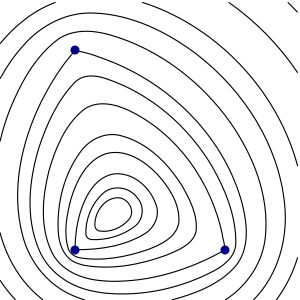n-ellipse
In geometry, the n-ellipse is a generalization of the ellipse allowing more than two foci.[1] n-ellipses go by numerous other names, including multifocal ellipse,[2] polyellipse,[3] egglipse,[4] k-ellipse,[5] and Tschirnhaus'sche Eikurve (after Ehrenfried Walther von Tschirnhaus). They were first investigated by James Clerk Maxwell in 1846.[6]

Given n focal points (ui, vi) in a plane, an n-ellipse is the locus of points of the plane whose sum of distances to the n foci is a constant d. In formulas, this is the set
The 1-ellipse is the circle, and the 2-ellipse is the classic ellipse. Both are algebraic curves of degree 2.
For any number n of foci, the n-ellipse is a closed, convex curve.[2]: (p. 90) The curve is smooth unless it goes through a focus.[5]: p.7
The n-ellipse is in general a subset of the points satisfying a particular algebraic equation.[5]: Figs. 2 and 4, p. 7 If n is odd, the algebraic degree of the curve is , while if n is even the degree is [5]: (Thm. 1.1)
n-ellipses are special cases of spectrahedra.
See also
References
- J. Sekino (1999): "n-Ellipses and the Minimum Distance Sum Problem", American Mathematical Monthly 106 #3 (March 1999), 193–202. MR1682340; Zbl 986.51040.
- Erdős, Paul; Vincze, István (1982). "On the Approximation of Convex, Closed Plane Curves by Multifocal Ellipses" (PDF). Journal of Applied Probability. 19: 89–96. doi:10.2307/3213552. JSTOR 3213552. S2CID 17166889. Archived from the original (PDF) on 28 September 2016. Retrieved 22 February 2015.
- Z.A. Melzak and J.S. Forsyth (1977): "Polyconics 1. polyellipses and optimization", Q. of Appl. Math., pages 239–255, 1977.
- P.V. Sahadevan (1987): "The theory of egglipse—a new curve with three focal points", International Journal of Mathematical Education in Science and Technology 18 (1987), 29–39. MR872599; Zbl 613.51030.
- J. Nie, P.A. Parrilo, B. Sturmfels: "J. Nie, P. Parrilo, B.St.: "Semidefinite representation of the k-ellipse", in Algorithms in Algebraic Geometry, I.M.A. Volumes in Mathematics and its Applications, 146, Springer, New York, 2008, pp. 117-132
- James Clerk Maxwell (1846): "Paper on the Description of Oval Curves, Feb 1846, from The Scientific Letters and Papers of James Clerk Maxwell: 1846-1862
Further reading
- P.L. Rosin: "On the Construction of Ovals"
- B. Sturmfels: "The Geometry of Semidefinite Programming", pp. 9–16.